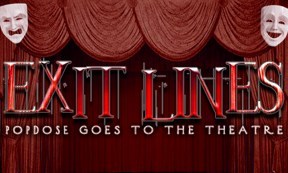 Broadway-bound this spring once its run downtown at the New York Theatre Workshop ends, Sing Street has been touted as the hope of a musical season that could use a little cheer. On paper it has a lot going for it. Like Once, which went from being an Oscar winner in 2007 to a Tony winner five years later, it’s based on a musical-ish film by writer-director John Carney, who with Gary Clark contributes music and lyrics to fill out the stage adaptation. Enda Walsh returns on book. Directing is Rebecca Taichman, whose musical-ish staging of the excellent Indecent won her a Tony in 2017.
Broadway-bound this spring once its run downtown at the New York Theatre Workshop ends, Sing Street has been touted as the hope of a musical season that could use a little cheer. On paper it has a lot going for it. Like Once, which went from being an Oscar winner in 2007 to a Tony winner five years later, it’s based on a musical-ish film by writer-director John Carney, who with Gary Clark contributes music and lyrics to fill out the stage adaptation. Enda Walsh returns on book. Directing is Rebecca Taichman, whose musical-ish staging of the excellent Indecent won her a Tony in 2017.
But lightning hasn’t struck…twice.
While Once the movie was a crowdpleasing indie hit, Sing Street came and went in the U.S. in 2016. That’s not disqualifying, and in fact not having the burden of “living up to” the source can be a plus. But having the spine of a film, successful or unsuccessful, to build from doesn’t guarantee something fully formed or organic for the stage will emerge. (Case in point: the recent dud musical Scotland, PA, from an even more obscure flop.) What’s so frustrating about Sing Street is that it doesn’t really try.
The show is set in Dublin in the early ’80s, with teen characters in conflict with a society that has barely changed with the times. Best known for offing Jon Snow on Game of Thrones, Brenock O’Connor here plays sixteen-year-old Conor, whose life is an impasse, what with his architect dad perpetually underemployed and feuding with his mom, his know-it-all if agoraphobic older brother Brendan (Gus Halper) nagging him, and the seductive and enigmatic Raphina (Zara Devlin) seemingly unattainable. Music, at it is so often in this brand of coming-of-age story, is his only balm. Packed off to a strict Christian Brothers school when the family finances nosedive Conor bands with the usual assortment of mildly colorful misfits, all of whom sling guitars and plink their way through New Wave hits by Depeche Mode and Duran Duran. Conor begins to find his voice, and with his mates crafts his own songs. Love ditties like “Riddle of the Model” and “Up” he pitches to Raphina, who starts to warm to him…but a mean priest (Martin Moran) threatens to pour cold water on his aspirations.
If this all sounds familiar…well, it is, and then some. That doesn’t mean it can’t work again, as an adolescent companion to say School of Rock. But inspiration is lacking, from the modestly catchy original music to the uninspired set and projections (were the crashing waves borrowed from The Rose Tattoo?). Leaning against a lamppost Devlin makes the biggest impression singing “Rio” but that bygone hit and a few others woven into the show upstage the new material. Everything works out predictably, as the boys cloud themselves in hairspray and go androgynous for a final rebel yell of a concert. Risk, however, is in short supply here, and other than throwing its 11 o’clock number to a supporting character it’s disappointing that Taichman hasn’t smashed a few staging norms in one of the more pedestrian productions I’ve seen at NYTW, a venue that lends itself to experimentation. (Hadestown began there in New York.) Given iffy reviews more work is promised before Broadway, as Sing Street in its present state of construction isn’t much of a destination.





Comments